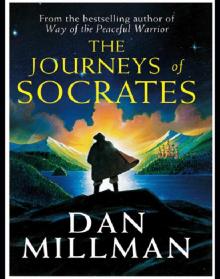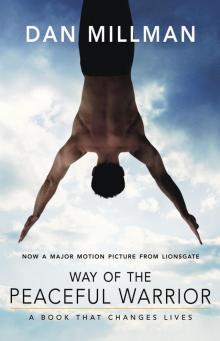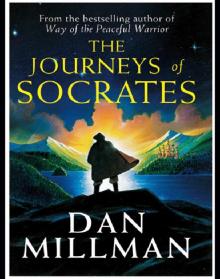- Home
- Dan Millman
WAY OF THE PEACEFUL WARRIOR: A Book That Changes Lives Page 8
WAY OF THE PEACEFUL WARRIOR: A Book That Changes Lives Read online
Page 8
I didn’t dare go in. I stationed myself in a nearby phone booth. Ten minutes passed; twenty minutes. Could I have missed him? My bladder was sending out emergency signals. I had to go in — not only to find Socrates, but to make use of the facilities. And why not? This was my domain after all, not his. I would make him explain. Still, it would be awkward.
Entering the tiled bathroom, I saw no one at first. After finishing my own business, I started to search more carefully. There was no other door, so he still had to be there. One guy came out of a stall and saw me hunched over, looking under the stalls. He hurried out the door with wrinkled brow, shaking his head.
Back to the business at hand. I ducked my head for a quick look under the last stall. First I saw the backs of a pair of sandaled feet, then suddenly Soc’s face dropped into view, upside down with a lopsided grin. He obviously had his back to the door and was bending forward, his head down between his knees.
I stumbled backward in shock, completely disoriented. I had no good reason for my bizarre bathroom behavior.
Socrates swung the stall door open and flushed with a flourish, “Whoooeee, a man can get constipated when he’s being stalked by a junior warrior!” As his laughter thundered through the tiled room, I reddened. He’d done it again! I could almost feel my ears lengthen as I was once again transformed into a jackass. My body churned with a mixture of shame and anger.
I could feel my face turn red. I glanced at the mirror, and there, tied neatly in my hair, was a perky yellow ribbon. Things began to make sense: the people’s smiles and laughter as I’d walked through campus, the strange look I’d gotten from my fellow bathroom occupant. Socrates must have affixed it to my head while I dozed off in the bushes. Suddenly very tired, I turned and walked out the door.
Just before it swung shut, I heard Socrates say, not without a tone of sympathy in his voice, “That was just to remind you who is the teacher and who is the student.”
That afternoon, I trained like the unleashed furies of hell. I talked to no one, and wisely, no one said a word to me. I quietly raged and swore I’d do whatever was necessary to make Socrates acknowledge me as a warrior.
One of my teammates stopped me on my way out and handed me an envelope. “Someone left this in the coach’s office. It’s addressed to you, Dan. A fan of yours?”
“I don’t know. Thanks, Herb.”
I stepped outside the door and ripped open the envelope. On an unlined piece of paper was written: “Anger is stronger than fear, stronger than sorrow. Your spirit is growing. You are ready for the sword — Socrates.”
CHAPTER THREE
CUTTING FREE
The next morning, fog had rolled in off the bay, covering the summer sun, chilling the air. I awoke late, made some tea, ate an apple, pulled out my small TV, and dumped some cookies into a bowl. Switching on a soap opera, I immersed myself in someone else’s problems. As I watched, mesmerized by the drama, I reached for another cookie and discovered that the bowl was empty. Could I have eaten all those cookies?
Later that morning, I went running around Edwards Field. There I met Dwight, who worked up at the Lawrence Hall of Science in the Berkeley hills. I had to ask his name a second time, because I “didn’t catch it” the first time, another reminder of my lack of attention and wandering mind. After a few laps, Dwight remarked about the cloudless blue sky. But lost in thought, I hadn’t even noticed the sky. Then he headed for the hills — he was a marathon runner — and I returned home, thinking about my mind — a self-defeating activity if ever there was one.
I observed that in the gym I kept my attention focused precisely on every action, but when I stopped soaring, my thoughts would again obscure my perception.
That night I walked to the station early, hoping to greet Socrates at the beginning of his shift. By now I’d done my best to forget about yesterday’s incident in the library and was ready to hear any antidote to my hyperactive mind that Soc cared to suggest.
I waited. Midnight arrived. Soon after, so did Socrates.
We had just settled into the office when I started to sneeze and had to blow my nose. I had a slight cold. Soc put the teakettle on, and I began, as was my custom, with a question.
“Socrates, how do I stop my thoughts, my mind — other than by developing a sense of humor?”
“First you need to understand where your thoughts come from, how they arise in the first place. For example, you have a cold now; its physical symptoms tell you when your body needs to rebalance itself, to restore its proper relationship with sunlight, fresh air, simple food. Just so, stressful thoughts reflect a conflict with reality. Stress happens when the mind resists what is.”
A car rolled into the station bearing a formally dressed older couple who sat like two ramrods in the front seat. “Come with me,” Soc ordered. He removed his windbreaker and his cotton sport shirt, revealing a bare chest and shoulders with lean, well-defined muscles under smooth, translucent skin.
He walked up to the driver’s side of the car and smiled at the shocked pair. “What can I do for you folks? Gasoline to fuel your spirits? Perhaps oil to smooth out the rough spots in your day? How about a new battery to put a little charge in your life?” He winked at them openly and stood his ground, smiling, as the car lurched forward and sped away from the station. He scratched his head. “Maybe they just remembered that they left the water running at home.”
While we relaxed in the office, sipping our tea, Socrates explained his lesson. “You saw that man and woman resist what to them represented a strange situation. Conditioned by their values and fears, they haven’t learned to cope with spontaneity. I could have been the highlight of their day.
“You see, Dan, when you resist what happens, your mind begins to race; the thoughts that assail you are actually created by you.”
“And your mind works differently?”
“Yes and no. My mind is like a pond without ripples. Your mind is full of waves because you feel separated from, and often threatened by, an unplanned, unwelcome occurrence. Your mind is like a pond into which someone has just dropped a boulder!”
As I listened, I gazed into the depths of my teacup, when I felt a touch just behind the ears. Suddenly my attention intensified; I had stared deeper and deeper into the cup, down, down...
I was underwater, looking up. This was ridiculous! Had I fallen into my teacup? I had fins and gills; very fishy. I whipped my tail and darted to the bottom, where it was silent and peaceful.
Suddenly a huge rock crashed into the water’s surface. Shock waves slapped me backward. My fins whipped the water again and I took off, seeking shelter. I hid until everything quieted down again. As time passed, I became accustomed to the little stones that sometimes fell into the water, making ripples. The large plunks, however, still startled me.
In a world filled with sound and dryness again, I lay on the couch, looking up, wide-eyed, at Soc’s smile.
“Socrates, that was incredible!”
“Please, not another fish story. I’m glad you had a nice swim. Now, may I continue?” He didn’t wait for an answer.
“You were a very nervous fish, fleeing every large ripple. Later, you became used to the ripples but still had no insight into their cause. You can see,” he continued, “that a magnificent leap of awareness is required for the fish to extend its vision beyond the water in which it is immersed to the source of the ripples.
“A similar leap of awareness will be required of you. When you understand the source clearly, you’ll see that the ripples of your mind have nothing to do with you; you’ll just watch them, without attachment, no longer compelled to overreact every time a pebble drops. You will be free of the world’s turbulence as soon as you stop taking your thoughts so seriously. Remember — when you are in trouble, let go of your thoughts to see through your mind!”
“Socrates, how?”
“A not-so-bad question. As you’ve learned from your physical training, leaps of awareness don’t happen all at once; th
ey require time and practice. And the practice of insight into the source of your own ripples is meditation.”
With that grand announcement, he excused himself and went to the bathroom. Now it was time to spring my surprise on him. I yelled from the couch, so he could hear me through the bathroom door. “I’m one step ahead of you, Socrates. I joined a meditation group a week ago. I thought I’d do something myself about this old mind of mine,” I explained. “And I’m already starting to relax more and get some control over my thoughts. Have you noticed I’ve been calmer? In fact — “
The bathroom door blasted open and Socrates came straight at me, screaming a bloodcurdling shriek, holding a gleaming samurai sword over his head! Before I could move, the sword slashed at me, cutting silently through the air, and stopped inches over my head. I looked up at the hovering sword, then at Socrates. He grinned at me.
“What the hell! You scared the shit out of me!” I gasped.
The blade ascended slowly. Poised over my head, it seemed to capture and intensify all the light in the room. It shone in my eyes and made me squint. I decided to shut up.
Socrates knelt on the floor in front of me, gently placed the sword between us, closed his eyes, took a deep breath, and sat perfectly still. I watched him for a while, wondering if this “sleeping tiger” would waken and leap at me if I moved. Ten minutes passed, then twenty. I figured maybe he wanted me to meditate, too, so I closed my eyes and sat for half an hour. Opening my eyes, I watched him still sitting there like a Buddha. I started to fidget and got up quietly to get a drink of water. I was filling my mug when he put his hand on my shoulder. Water sloshed over my shoes as my hand jerked.
“Socrates, I wish you wouldn’t sneak up on me like that. Couldn’t you make some noise?”
He smiled, and spoke. “Silence is the warrior’s art — and meditation is his sword. With it, you’ll cut through your illusions. But understand this: the sword’s usefulness depends upon the swordsman. If you don’t know how to use the weapon properly, it can become a dangerous, deluding, or useless tool. Meditation can initially help you to relax. You may put your ‘sword’ on display, proudly show it to friends. The gleam of this sword distracts many meditators until they abandon it to seek other esoteric techniques.
“In contrast, the warrior uses the sword of meditation with skill and understanding. With it, he cuts the mind to ribbons, slashing through thoughts to reveal their lack of substance. Maybe you recall the story of Alexander the Great, marching with his armies through the desert and coming upon two thick ropes tied in the massive, convoluted Gordian knot. No one had ever been able to untie it. Without a moment’s hesitation Alexander drew his sword and, in one powerful blow, sliced the knot in two. This is the warrior’s way of meditation. And this is how you must learn to attack the knots of your mind. Until one day you transcend your need for any weapon at all.”
Just then an old VW bus with a new coat of white paint and a rainbow painted on its side chugged into the station. Inside sat six people, hard to tell apart. As we approached them, we could see that there were two women and four men, all dressed from head to toe in the same blue outfits. I recognized them as members of one of the many new spiritual groups in the Bay Area. These particular people self-righteously avoided acknowledging our presence, as if our worldliness might contaminate them.
Socrates, of course, rose to the challenge, immediately affecting a combination limp and lisp persona. Scratching himself profusely, he was the perfect Quasimodo. “Hey, Jack,” he said to the driver, who had the longest beard I’d ever seen, “ya want gas, or what?”
“Yes, we want gas,” the man said, his voice as smooth as olive oil.
Socrates leered at the two women in the back and, sticking his head in the window, he whispered loudly, “Hey do you meditate?” He said it as if he were referring to a solitary form of sexual release.
“Yes, we do,” said the driver, cosmic superiority oozing from his voice. “Now, will you put gas in our vehicle?”
Soc waved at me to fill the tank, while he proceeded to push every button the driver had. “Hey, ya know, you look kinda like a girl in that dress, guy — don’t get me wrong, it’s real pretty. And why don’t you shave; what are ya hiding under that fuzz?”
While I cringed, he went from bad to even worse. “Hey,” he said to one of the women, “is this guy your boyfriend? Tell me,” he said to the other man in the front seat, “do you ever do it, or do you save it up like I read in the National Enquirer?”
That about did it. By the time Socrates counted out their change — with agonizing slowness — he kept losing count and starting over — I was ready to burst out laughing and the people in the van were trembling with anger. The driver grabbed his change and drove out of the station in a very unsaintly way. As their van pulled out, Socrates yelled, “I hear meditation is good for you. Keep practicing!”
We’d no sooner returned to the office when a big Chevy pulled into the station. The clang of the business bell was followed by an impatient “ooga-ooga” from a musical horn. I went out with Socrates to help.
Behind the wheel sat a forty-year-old “teenager” dressed in flashy satin clothes topped with a large feathered safari hat. He was extremely jittery and kept tapping the steering wheel. Next to him, batting false eyelashes in the rearview mirror as she powdered her nose, sat a woman of indeterminate age.
For some reason, they offended me. They looked asinine. I wanted to say, “Why don’t you act your age?” but I watched and waited.
“Hey man, ya got a cigarette machine here?” the hyperactive driver said.
Socrates stopped what he had been doing and with a warm smile said, “No, sir, but there’s an all-night market down the road.” Then he returned to checking the oil, giving it his full attention. He returned the change as if he were serving tea to the emperor.
After the car sped away we remained at the pump, smelling the night air. “You treated these people so courteously but were positively obnoxious to our blue-robed seekers, who were obviously on a higher evolutionary level. What’s the story?”
For once, he gave me a simple, direct answer. “The only levels that should concern you are mine — and yours,” he said with a grin. “These people needed kindness. The spiritual seekers needed something else to reflect upon.”
“What do I need?” I blurted.
“More practice,” he answered quickly. “Your practice didn’t help you stay calm when I ran at you with the sword, nor did it help our blue-robed friends when I poked a little fun at them.
“Let me put it this way: A forward roll is not the whole of gymnastics. A meditation technique is not the whole of the warrior’s way. If you fail to understand the complete picture, you might be deluded, practicing only forward rolls — or only meditation — your whole life, thus reaping only fragmented benefits of training.
“What you need is a map of the entire terrain you need to explore. Then you’ll realize the uses, and the limits, of meditation. And I ask you, where can you get a good map?”
“At a service station, of course.”
“Right you are, sir. Just step into the office. I have just the map you need.” We entered laughing, through the garage door. I plopped onto the couch; Socrates settled without a sound between the massive armrests of his plush chair.
He stared at me for a full minute. I started getting goose bumps. “Uh-oh,” I said nervously under my breath. “What’s up?”
“The problem is,” he sighed at last, “that I can’t describe the terrain for you, at least not in so many... words.” He rose and walked toward me with that shine in his eye that told me to pack my suitcases — I was going on a trip.
For an instant, from a vantage point somewhere in space, I felt myself expanding at the speed of light, ballooning, exploding to the outermost limits of existence until I was the universe. Nothing separate remained. I had become everything. I was Consciousness, recognizing itself; I was the pure light that physicists equate wit
h all matter, and poets define as love. I was one, and I was all, outshining all the worlds. In that moment, the eternal, the unknowable had been revealed to me as an indescribable certainty.
In a flash, I was back in my mortal form, floating among the stars. I saw a prism shaped like a human heart, which dwarfed every galaxy. It diffracted the light of consciousness into an explosion of radiant colors, sparkling splinters of every rainbow hue, spreading throughout the cosmos.
My own body became a radiant prism, throwing splinters of multicolored light everywhere. And it came to me that the highest purpose of the human body is to become a clear channel for this light — so that its brightness can dissolve all obstructions, all knots, all resistance.
I felt the light diffracted across the systems of my own body. Then I knew that awareness is how the human being experiences the light of consciousness.
I learned the meaning of attention — it is the intentional channeling of awareness. I felt my body again, as a hollow vessel. I looked at my legs; they filled with warm, radiant light, disappearing into brightness. I looked at my arms, with the same result. I focused attention on every part of the body, until I became wholly light once again. Finally, I realized the process of real meditation — to expand awareness, to direct attention, to ultimately surrender to the light of consciousness.
A light flickered in darkness. I awoke to Socrates shining a flashlight back and forth across my eyes. “Power failure,” he said, baring his teeth like a Halloween pumpkin as he held the light up to his face. “Well, is it all a bit clearer now?” he asked, as if I had just learned how a lightbulb worked, rather than seen the soul of the universe. I could hardly speak.
“Socrates, I owe you a debt that I can never repay. I understand everything now, and I know what I must do. I don’t suppose I’ll be needing to see you again.” I was sad that I had graduated. I would miss him.

 SACRED JOURNEY OF THE PEACEFUL WARRIOR
SACRED JOURNEY OF THE PEACEFUL WARRIOR The Journeys of Socrates: An Adventure
The Journeys of Socrates: An Adventure WAY OF THE PEACEFUL WARRIOR: A Book That Changes Lives
WAY OF THE PEACEFUL WARRIOR: A Book That Changes Lives The Journeys of Socrates
The Journeys of Socrates The Hidden School
The Hidden School